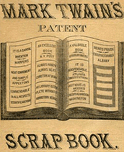TWAIN, CABLE & POND.
SPECIAL DISPATCH TO THE HERALD, NEW
YORK, 9 MAY.--Rumors of a triangular row have gone
out from the Everett House and thence penetrated the
remotest corners of the literary metropolis. The story grew
as it spread, until it told of personal conflict, even
fisticuffs, between Mark Twain, Maj. J. B. Pond and George
W. Cable; but when inquiry was today made as to whether two
of the named notables had fallen upon the third, or each of
the three had assaulted the two others, tremendous
exaggeration was disclosed. There had been no physical
encounter, and only a business disagreement so private and
intangible that few particulars can be ascertained. It is
certain, however, that the tour which Twain and Cable
lately made as readers of their own works, under the
management of Pond, resulted in profit and ill-humor
equally large. Twain was the originator of the scheme, and
he invited Cable to his home in Hartford, where the details
of the proposed entertainment were arranged. It is Pond's
business to manage lecturers and other lyceum performers,
and he was offered a partnership in the enterprise. The
contract provided that the "travelling expenses," added to
the costs of advertising and halls, should first be
deducted from the receipts, and the remainder divided into
three equal shares for the partners. They did not follow
the common practice of engaging with local societies, but
trusted wholly to the dual strength of the humorist and the
novelist, to draw audiences independently at theatrical
prices. When they returned from the successful venture, and
put up at the Everett, where Pond and Twain lived a
considerable part of their time, it was observed that
amicability had departed from the midst of the trio. Cable
talked vaguely to his friends of hoggishness on the part of
Twain in getting a disproportionate share of the glory, and
Twain vowed, in seeming acrimony, that he would never,
never go on the platform again; but Pond's plaint was less
sentimental, for it related to the nature of the charges
which his companions made as "travelling expenses." Cable
was the chief offender in that way. His theory was that so
highly luxurious a thing as champagne and so lowly a one as
the blacking of his boots properly belonged to the
partnership account, and Pond declares that the bills
rendered by Cable are greater curiosities of literature
than the best of his creole dialect. All three admit that
the firm of Twain, Cable & Pond is permanently
dissolved.
|





